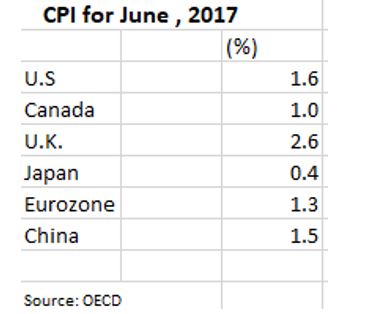Another month brings another spate of data on job growth, wages and inflation which then feed into speculation of when the central banks will raise rates again. In July, the U.S. economy generated just over 200,000 new jobs and recorded an unemployment rate of 4.3%. Canada created 11,000 additional jobs and the unemployment rate fell slightly to 6.3%. On both sides of the border, analysts immediately started to lay their bets on the timing and extent of future rate hikes from their respective central banks. The game of how fast and far rates will rise now is afoot.
Yet what continuously gnaws at the back of the minds of bankers is that the real conditions that would justify rate increases are conspicuously absent. For nearly 18 months, we have witnessed economic growth in the 2% range, modest wage increases and inflation running well-below target. Inflation in the OECD countries is at the slowest pace in nearly eight years.Yet, the Fed seems bent on pushing forward with its plans to shrink its balance sheet, “very soonâ€, according to the latest FMOC minutes. The Bank of Canada just raised its overnight rate and now speculation is rife that we can expect another rate hike as early as October. The European Central Bank has sent somewhat mixed signals that QE will cease shortly but has introduced the notion that monetary tightening may be on the way.
 As the accompanying table demonstrates, the large economies have provided little in the way of support for such tightening measures. Inflation is running well below the 2% mark in June for most of the major industrialized nations. The one exception is the U.K. which has been hit by a major drop in the value of the pound in response to unsettled conditions regarding Brexit.Â

Cardiff Garcia of the FT offers a very interesting interpretation why central banks seem to ignore the lack of inflation when he states that:
A central bank’s willingness to tighten policy despite meager inflation is sometimes considered optimistic because policymakers expect the economy to return to full employment and target inflation despite less support from policy…. Rather than greeting this development {i.e. low inflation} as a gift that allows them to keep bolstering their economies, central banks are cautious, as though they do not quite believe what is plainly manifest in the data.[1]

